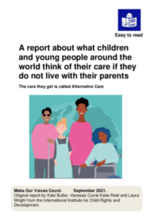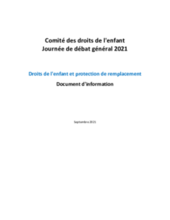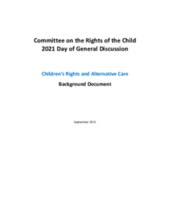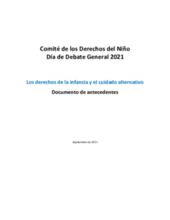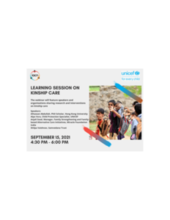Displaying 941 - 950 of 4424
This report is about what children and young people told us about their care and what they want to change. This report is for a meeting that happened in September 2021. The meeting was about care for children who do not live with their parents. People from around the world were at the meeting.
Ce document d'information a pour objectif de synthétiser et de présenter les données probantes communiquées dans les contributions soumises au Comité dans le cadre de la procédure de concertation publique (voir le point 1.3 ci-dessous pour plus de
El objetivo de este documento de antecedentes es sintetizar y recopilar las pruebas recibidas por el Comité durante el proceso público de consulta.
Registration for the 2021 DGD is now open. The virtual event will take place over two half days on 16 and 17 September 2021, during the 88th session of the Committee on the Rights of the Child.
IACN, in collaboration with UNICEF, is organising a learning session on kinship care on 15 September, from 4:30 p.m to 6: 00 p.m. In this session, speakers and organisations will discuss their interventions on kinship care in diverse contexts in India. Additionally, a researcher from Ghana will share the findings of a qualitative study on the experiences of children and caregivers in kinship care. Please see below for details of the session.
In advance of the 2021 Day of General Discussion on Children's Rights and Alternative Care, Family for Every Child is pleased to present this "How We Care" online event on International Approaches to Child Participation.
Dates: 5 Sep - 23 Sep 2022
Location: Geneva, Switzerland (Palais Wilson, Ground Floor Conference Room)
The following countries will present state reports for consideration:

